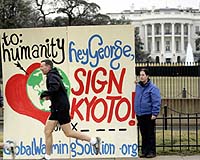| . |  |
. |
Bangkok (AFP) Oct 8, 2009 UN climate negotiations are making real progress, but will fail to lay the foundation for a global treaty without a major push from world leaders, the UN climate chief said Thursday. "There is a general sense that this process needs the backing of political leaders at the highest level in order to get to a result," said Yvo de Boer, Executive Secretary of the UN Framework Convention on Climate Change (UNFCCC). Technical talks in Bangkok, ending Friday, are the prelude to a critical December conference in Copenhagen tasked with delivering a treaty to save the planet from the ravages of climate change. All parties agree that carbon pollution must be drastically slashed in order to forestall catastrophe, but how to share out that task, and who should foot the bill, has split rich and poor nations into opposing camps. The hugely complex talks, set on course by the so-called Bali Action Plan of December 2007, are unfolding at two levels. Expert negotiators from more than 190 countries have met periodically in one or two-week sessions over the past two years to search for common ground on a raft of issues. These range from technology transfers to mechanisms for funneling money to poor countries. To date, however, the discussions have been mind-numbingly technical, focused largely on procedure and protocol. Very little of substance has been decided, delegates and observers agree. "Bangkok should render the positions understandable at a political level" in preparation for Copenhagen, a senior European Union negotiator told AFP on condition of anonymity. Part of that task is cleaning up the draft template for a new global treaty -- a compendium of clashing views described by de Boer as "an absolute mess" ahead of the talks in the Thai capital. In parallel, ministers and heads of state have sought to define the broad contours of a path to a low carbon global economy, through a flurry of bi-lateral and multi-lateral meetings. "Its a two way process, top-down and bottom-up," the EU negotiator said. "Negotiators have to clarify the stakes for the politicians, and the politicians have to clarify the mandate for the negotiators," he added. In September, UN chief Ban Ki-moon convened the first-ever climate summit in New York, followed a few days later by a G-20 summit where climate change was also on the agenda. The Bangkok talks have been abuzz with rumours of another such summit before the Copenhagen meeting, but so far no dates have been announced. Neither of September's meetings generated the clarity and momentum that was hoped for, leaving the more technical talks adrift. "Unless we see an advance on key political issues... it is very difficult for negotiators in this process to continue their work in good faith," de Boer told journalists. Those cornerstones, he said, were ambitious targets by rich nations for cutting heat-trapping carbon pollution, and hundreds of billions of dollars to help developing countries fight global warming and cope with its impact. There is only one more five-day negotiating session, in Barcelona in November, before the final December showdown, and most participants say the big breakthroughs will only come at the last minute. "We probably won't see real progress on those political hurdles until the last night in Copenhagen," said Kim Cartensen, head of the WWF's climate programme. Michael Cutajar of Malta, one of two chairmen in the negotiations, acknowledged as much when he told delegates in Bangkok, with a smile, that the pieces probably won't fall into place "until the night before the morning after". But many negotiators say this kind of last-minute brinkmanship is dangerous. "We should not have to wait until December 18," said Lumumba Di-Aping, Sudan's ambassador to the United Nations and chairman of the G77 group of developing nations. "If that is the game that is being played, then it is a rather irresponsible game," he told AFP. Share This Article With Planet Earth
Related Links Climate Science News - Modeling, Mitigation Adaptation
 Climate: What's to become of the Kyoto Protocol?
Climate: What's to become of the Kyoto Protocol?Bangkok (AFP) Oct 7, 2009 Whether to tweak, bolster or bury the Kyoto Protocol -- the only binding global agreement for curbing greenhouse gases -- has become a red-hot issue as UN negotiators in Bangkok try to lay the groundwork for a successor treaty. The flare-up has erupted only two months before the December 7-18 UN conference tasked with delivering a planet-saving climate deal. It pits rich nations against ... read more |
|
| The content herein, unless otherwise known to be public domain, are Copyright 1995-2009 - SpaceDaily. AFP and UPI Wire Stories are copyright Agence France-Presse and United Press International. ESA Portal Reports are copyright European Space Agency. All NASA sourced material is public domain. Additional copyrights may apply in whole or part to other bona fide parties. Advertising does not imply endorsement,agreement or approval of any opinions, statements or information provided by SpaceDaily on any Web page published or hosted by SpaceDaily. Privacy Statement |